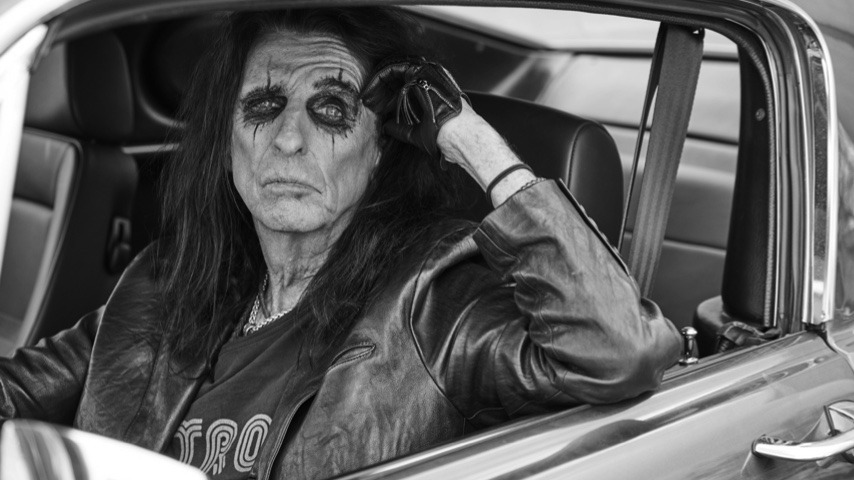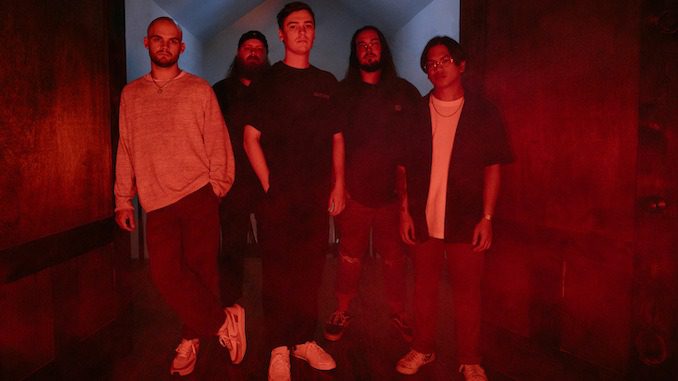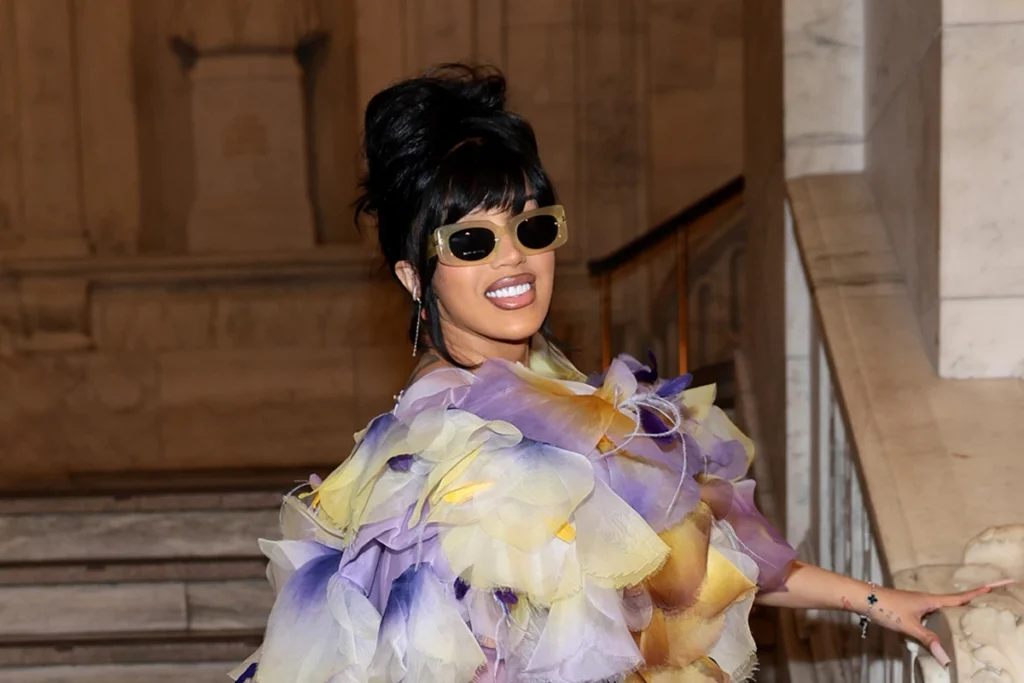Detroit-born shock rocker Alice Cooper still clearly remembers campy cinematic milestones like John Landis’ sketch-comedy experiment Kentucky Fried Movie, and in particular its Enter the Dragon-spoofing mini-film “A Fistful of Yen.” When two kung fu prisoners are brought before the Dark Lord villain for punishment, the first gets his head succinctly chopped off, but the second unrepentant man verbally accosts his captor, who, enraged, condemns him to a far more frightening fate: “Take him to Detroit!” “No, not Detroit! anything but that!,” the fellow screams as they drag him away. “But—even when Detroit was the butt of the joke all the time, like in that famous movie line—I always bragged about being from Detroit,” says the Rock and Roll Hall of Famer, who just turned 73. “And when you look at all the musical history coming out of my hometown, you can’t help but say, ‘Hey—I am proud of being from that place!’”
So—despite the old ‘You can never go home again’ adage—Cooper, AKA Vincent Furnier, did his damnedest to do just that on his new concept album, Detroit Stories, his 21st. He not only returned to Detroit to record it (at Rustbelt Studios in the city’s Royal Oak suburb, with legendary producer Bob Ezrin at the helm), he used nothing but local musicians over its 15 generous tracks, including original Detroit Wheels drummer Johnny “Bee” Badanjek, bassist Paul Randoplh, the Motor City Horns, and—as his guitarist and co-writer for much of the material—MC5 axeman Wayne Kramer, who infuses a trashy, garage-rock spirit to “Go Man Go,” “Hail Mary,” “Social Debris,” and the rabble-rousing mission statements “Don’t Give Up” and “Shut Up and Rock.” There’s also a tribal take on a vintage Bob Seger nugget, “Eastside Story,” a chugging MC5 cover (“Sister Anne”), and an inventive reworking of The Velvet Underground classic, “Rock and Roll.” And Cooper’s voice has never sounded surlier, more impassioned, than on this solid collection; He may not be growling “I’m Eighteen” like he first did back in 1971, but the true-believer rock ’n’ roll conviction is still there.
The list of this artist’s accomplishments is staggering. He’s worked with Salvador Dali, Vincent Price, Mae West, even Groucho Marx, and appeared as film villains himself, as well as composing the movie soundtracks. He’s also appeared on Hollywood Squares, in Mike Myers’ Wayne’s World (in the hilarious “We’re not worthy!” genuflection scene), and he has his own Nights With Alice Cooper syndicated radio show and a personally endorsed Alice Cooper’s Nightmare Castle pinball machine. Plus, he’s pals with the Muppets. But mainly, Cooper would like to take you to Detroit this year, no kicking and screaming necessary. It will be an enjoyable journey.
Paste: In the recent Frank Marshall Bee Gees documentary for HBO, you show up as a talking head, sneering, “Disco? That’s old people’s music!”
Alice Cooper: Ha! Well, it was the enemy of hard rock, that’s for sure.
Paste: And I started thinking that by now, you’ve probably actually written with one or more of the Gibb brothers.
Cooper: Well, for one thing, you end up writing with everybody. And even in the hardest rock times, the most metal times, I challenged almost every one of the metal guys by saying, “Okay—guilty pleasure. I guarantee you that 70% of you either have Saturday Night Fever or The Carpenters’ Greatest Hits somewhere in your collection.” Because, first of all, Saturday Night Fever was the Sgt. Pepper of disco—it went beyond disco, and every song was so good on that record. They were just great songs. And same thing with The Carpenters. After you’ve listened to Cradle of Filth for two hours, and then all of a sudden you put on a Carpenters album? It’s like, “Yeah! Okay!” And those guys wrote such great songs—The Bee Gees were amazing, and they don’t get enough credit. And we did a movie together—we did Sgt. Pepper’s Lonely Hearts Club Band, and in fact there was a scene where we have a fist fight and a pie fight. And actually, I took that movie for one good reason. One was The Bee Gees, because I thought it would be fun to do a Beatles song with The Bee Gees doing the background vocals, because they’re the prettiest songs. And I wanted to work with George Martin. George Martin was producing it, so I really wanted to say that I did a song with George Martin. And we did the song (“Because”) exactly like The Beatles—I did a pretty good John Lennon impersonation—and he said, “Well, that’s good. But how would Alice do this?” And then I did the theatrical version of it. And John (Lennon) said, “Only Alice could turn our prettiest song into a threat!”
Paste: And your latest IMDB contribution is doing the voice of Windy Pete on the animated kids’ show Bubble Guppies.
Cooper: I have so much credibility with my grandchildren now, it’s amazing. I am also Professor Aleister Coupe DeVille on Mickey Mouse. And the guys there [at Disney]? You have to remember, almost everybody in their 60s are all hard rock fans—they’re all Alice Cooper fans. So working with them, they like me a lot because I’m quick—I get it done really quick. I do the line three times, three different ways, and move on. So I think I take less time than anybody else does, doing those voiceovers, and I think they appreciate that.
Paste: But the bullet point of your latest presentation is that Kiss was right—you gotta lose your mind in Detroit, Rock City.
Cooper: Well, yeah. That’s the hometown for me. Detroit was where I was born, and the band? Well, we went to L.A., and L.A had The Doors and Love and all this sexy rock ’n’ roll, and San Francisco had the earthier stuff, like The Grateful Dead and Jefferson Airplane, and New York had The Rascals and that New York sound. But Detroit was the guitar-driven, hard-rock capitol, and that was where we belonged. So when we moved back to Detroit, we played every weekend with The Stooges and the MC5 and Bob Seger and Ted Nugent. And if you didn’t go onstage with attitude, and loud? They were gonna kill you. The Detroit audience was there for one thing—they wanted loud, in-your-face rock ’n’ roll. And that’s what we did, except that we put the theatrics on top of it. But if you took all the theatrics away, we were one of the most ballsy bands out there.
Paste: And you’re still co-writing with an early band member, Dennis Dunaway, on new cuts like “Independence Dave” and “I Hate You.” That’s some great continuity.
Cooper: The funny thing about the Alice Cooper Band was, most bands when they break up, they’re angry with each other, it’s about money, it’s about this, it’s about that. And they never talk to each other again. Our group didn’t divorce—we just separated in ’74. I went on to do “Welcome to My Nightmare,” and they all did Billion Dollar Babies and whatever else they were doing. But we always played on each other’s music. Dennis, Neal [Smith], and Mike [Bruce] always had an open invitation, at any time, to play on any of my records. And they would call me up and say, “Hey, would you do a vocal on this?” And I’d say, “Yeah. Sure!” So I’ve been working with Dennis, Neal and Mike ever since—we never lost touch with each other. That’s where that song on the new album called “I Hate You” came from, because each guy wrote a verse about the other guy—Mike was singing about Dennis, I was singing about Mike, Neal was singing about someone else. It was one of those things where we were allowed to roast each other on the song. And for people that thought that we hated each other, we really turned them around, saying, “No—we don’t hate each other at all. We’ve been friends since high school.”
Paste: And the album closes on “East Side Story,” an actual Bob Seger composition.
Cooper: I think Bob Seger actually kind of balked there for a second. I said, “Hey—we’re doing one of your songs.” And he was expecting us to do “Get Out of Denver” or something like that. And I said, “We’re doing ‘East Side Story,’” and he goes, “What? I forgot all about that song!” Because it was so early in his career. And you know where we saw it? It was a video of him doing this song with his band on a Canadian rock ’n’ roll show in the afternoon, in Windsor somewhere. And he was 17, 18 years old, and we heard this song. So he asked, “Why that song?” And I said, “I’m from the East side—I’m from East Detroit.” And it was a storyline, a great little lyrical tale, and I said, “I can take that story and make it a little more visual, and I wanna treat it—give it a Detroit treatment.” Same thing with the Lou Reed song (opening track “Rock and Roll”). Lou Reed did “Rock and Roll” with The Velvet Underground, and it had that sort of heroin chic to it. But I said, “No, with that song, I’m gonna take it to Detroit and give it a Detroit treatment, where it’s rock, it’s guitar, and the drums on that are amazing. And the guitarists are Joe Bonamassa and Steve Hunter, so that song rocks—it just never got treated like that before.
Paste: And “Sister Anne” was penned by the MC5’s late, great Fred “Sonic” Smith?
Cooper: Wayne Kramer played me a bunch of songs from The MC5, and we wanted to do one of the songs. But that one jumped out. I thought we could really let go on that song. I play harp on it, and Wayne plays guitar on it. And I love Wayne’s guitar playing—he’s got this real street sound with what he does, and I think he’s a better player now than he was back then.
Paste: And you co-wrote half the album with Wayne. Have you been in touch with him all along, too?
Cooper: You know, we actually took him on tour in Europe—The MC50 they were called at the time. And they were great, a great band. And when I heard that he was available, I really hadn’t seen him in years and years. Because we used to play with him every weekend in Detroit. So when I heard him play, I said, “Bob [Ezrin]—this is great. It’s gonna be fun playing with Wayne, because we’re really gonna capture the Detroit Sound with this.” Because every player on the album was from Detroit, except for Bonamassa—we made him a guest, a guest Detroiter.
And we recorded it in Detroit, in Royal Oak, which is where all my aunts and uncles live, in Royal Oak. So I was literally in my own back yard there. And the one thing about the Detroit players, when you get into the guitar players and the bass players and everything, there’s a touch of R&B in their DNA. And I said, “Let that be—I want that in there, because that’s the flavor of Detroit, that little bit of Motown in their playing.”
Paste: And that sound is all over the cut “$1,000 High Heel Shoes,” a real horn-punctuated R&B hip-shaker on the album.
Cooper: We let that one go—it’s total Motown. And on any other album, I would have said, “No, no, no—we’ve gotta get away from that.” But on this album, since it is Detroit, and since it is Motown, we put some girl singers on there, put the horn section from Motown on there, and let it be just totally funky. Because the song is funny—it’s about an Uber driver that spends all of his money on his girlfriend’s shoes. He’s even got guys looking for him to pay his gambling debts—they’re gonna kill him—but he’d rather see her in a pair of $1,000 high heeled shoes. I thought the storyline was kind of Chuck Berry-ish.
Paste: Speaking of stories, you’ve told me quite a few over the years, like the time you lost your snake on a South American tour and the promoter said no problem, he’d find you a replacement. Failing to mention—when he handed you a burlap bag before the show—that it might be wild and vicious.
Cooper: They took it off a tree! I mean, the snakes I use are big and angry looking, but they’ve been in captivity their whole life, they’ve been around humans their whole life—they have no problem with people picking them up at all, no attitude. But this thing had never seen a human, and when it came outta that bag, it came out to take my head off. And I went, “Where did you get this snake?” And they said, “Oh, we went into the jungle!”
Paste: What else has really scared you? You who seem pretty unflappable?
Cooper: I really only have a couple of phobias. Like claustrophobia—I don’t like getting in elevators at all. And needles. I can put my head in a guillotine with a 40-pound blade above me every night, no problem, and I can put a giant snake around my neck, as well. But a blood test? I am panicked. And I know it has nothing to do with pain, because it doesn’t hurt. It’s just the idea of a needle going in you. I could never be a junkie, ever. Because I just can’t stand needles.
Paste: What’s the building on the album cover? And the significance of the spooky mascaraed eyes watching over it?
Cooper: The building is actually in downtown Detroit, and I think that’s the Penobscot Building—it’s been there since I was a kid. And I like the idea of Alice’s eyes looking over the city. It’s kind of like the kindred spirit there—it’s looking over its own city. I commissioned it, and I actually told them, “This is what it should be—Alice’s eyes over the city, but then they put the spotlights on it. They got a little Batman there, but it was the right idea. It was really the right idea.
Paste: We talked about tangible things that freak you out. Have you ever experienced anything supernatural?
Cooper: Yeah. I had an experience with Joe Perry. Joe Perry and I were writing a song together, and Shep [Gordon, longtime manager] had a house in Queequeg, New York. And if you were looking for a house to film a horror movie in, this would be it. It was a nice house, but it sat by itself on a hill, nothing around it. And we decided to go there and write a couple of songs. Now he’d just gotten out of rehab, and so had I, and we had our assistants with us. And all day, I would put my suitcase on the bed and go in the bathroom, turn on the water, splash some water on my face, and I would come out and my suitcase would be opened. And I’d think, “Oh, my assistant did that.” Then I’d go back into the bathroom, where I knew I’d turned the water off, and the water would be on. So I started putting this all together—all day it was something like that, just little, irritating things. And at first, I thought, “Okay—I just got out of rehab, so I may not be completely on the money here.” But it was almost like something was playing with us, like Poltergeist. And then it sounded like somebody was moving furniture in the basement—it wasn’t just a bump or a little noise, that could maybe be a water heater. It sounded like somebody was moving furniture, while we were all sitting there, trying to ignore it. And it’s not like in the movies, where somebody says, “Well, let’s get a flashlight and go down there!” We got outa there—we all got outta there. And so I said to Shep, “Hey Shep—about your house…” And he said, “Oh yeah—that place is really weird! You know, they wrote The Amityville Horror there. And I was like, “And you were gonna tell me when?” He said his mom was having a dinner there with some friends, and at one point the entire dinner table moved a foot to the right. But it was more mischievous than something horrific. So we really experienced some sort of mischievous little guy in there.
Paste: 2020 kind of clarified the fact that horror cinema is really going through a classy Renaissance now, led by Samara “Ready or Not” Weaving as the new Scream Queen.
Cooper: There are so many good films, but then there are so many really, really bad ones. And I kind of feast on the really bad ones. Like, how about Velocipastor? About a pastor that turns into a velociraptor? And have you watched Ouija Shark? Where a shark comes out of a ouija board and chases these people around? I was laughing so hard, but they were so good. And it’s really rare when you see a horror movie that actually scares you. But my kids are really great about going on the Internet and finding the worst movies that anybody has ever made. There was one called The Monsturd—it comes to life in an outhouse and attacks people. And if you’re not laughing at that? Well, I learned a long time ago that comedy and horror are so close together. It’s like when you get on a rollercoaster—you know it’s gonna scare you, but you know you’re gonna be laughing at the end of it, because it’s gonna bring you back safely. And I kind of put that into early Alice Cooper—I said, “I’m gonna take you on a thrill ride, and you’re gonna be laughing and scared at the same time. But at the end? You know I’m gonna bring you back safely.” The Alice Cooper Show was a rollercoaster like that, an emotional rollercoaster.




